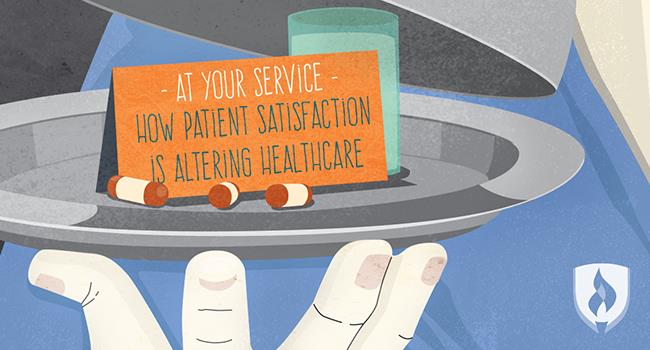At Your Service: How Patient Satisfaction is Altering Healthcare
By Megan Ruesink on 09/26/2016

Patient satisfaction has become a buzzword in the healthcare industry thanks to the Affordable Care Act (ACA). In 2012, the ACA introduced a program called Hospital Value-Based Purchasing (HVBP), or Quality-Based Purchasing (QBP), to many hospitals and healthcare facilities across the nation.
What do all these acronyms mean for healthcare careers, and why does patient satisfaction matter? Quality-based purchasing has brought patient satisfaction to the forefront of healthcare priorities in a big way. As a new or aspiring nurse, you need to know how QBP will affect your career, work environment and patients.
We’re breaking down everything you need to know about QBP and patient satisfaction, how it could affect your healthcare career and what you can do to keep patient health your top priority as a nurse.
Get Your Nursing School Questions Answered at a Nursing Information Session
What is quality-based purchasing?
In QBP, Medicare reimburses a percentage of hospital costs with a reward system based on a patient satisfaction survey called the Hospital Consumer Assessment of Healthcare Providers and Systems, or HCAHPS. The goal of QBP is to promote high-quality care for patients receiving Medicare benefits without increasing costs. Essentially, hospitals that perform well on the HCAHPS evaluation will receive a higher Medicare payout for the services they provided than hospitals that were rated lower.
You can see how this incentive is encouraging hospitals to take QBP seriously. The HCAHPS has a strong focus on the care that patients receive from healthcare professionals, with many questions focused on nursing care. Since nurses spend the most time with patients, these professionals have become somewhat of a focal point for many hospitals.
How does QBP affect you?
Now that you know what quality-based purchasing is, you need to know how it will affect your future as a nurse. Read up on the basics of QBP and what nurses, research and other resources have to say about how the program is impacting healthcare careers.
Hospitals are investing in improving patient satisfaction
No hospital wants to lose funding, so most of them are taking QBP regulations seriously. With the new HCAHPS survey, some healthcare facilities are now seeking to improve their overall scores by soliciting help from customer service consultants.
In fact, “customer service skills” are being featured in more and more nursing job descriptions. So honing your interpersonal skills could serve you well if you’re preparing to enter the job market.
While on rounds, nurses may be given scripts telling them what to say in order to improve patient satisfaction and achieve higher scores, according to Nick Angelis, CRNA, MSN and author. It’s not enough to focus on the technical aspects of caring for a patient; hospitals now value nurses who can show patients that they truly care about their health concerns.
It’s obvious that this program is changing the focus of the nursing career. It’s important that you prepare for the possibility of additional customer service training when you land a new position. Healthcare facilities may also have new job requirements you may not have been expecting.
Patients and families can be consumers
Patients, and sometimes their family members, are able to rate many aspects of the care they receive on the HCAHPS, giving them more of a voice in the care they receive. This places healthcare facilities in the same position as other businesses whose revenue can be impacted by positive or negative reviews from customers.
“Patients and families are able to be consumers,” says Lori Ranney, NP, “This helps hold nurses and providers accountable.”
As a nurse, you’ll need to be aware that your future patients will be rating your performance—which typically has more to do with your bedside manner than with the actual medical care you’ll be providing. They will probably answer questions like, “How often did nurses treat you with courtesy and respect?” or “During this hospital stay, how often did nurses listen carefully to you?”
Providing patient satisfaction can be tricky
While patients and their families can now be more vocal about their care, you’ll have to balance the pressure to “satisfy” a patient from a customer service standpoint with the necessity of providing excellent care to all your patients. And as all nurses know, some patients can be hard to please.
“It is hard to give hard news or not ‘satisfy’ a patient,” Ranney says. “A provider should not prescribe an antibiotic just because the patient wants one if their condition doesn't warrant it.” Healthcare professionals now have to weigh what a patient wants with what a patient needs from a medical standpoint, which can put their “customer service” rating in jeopardy.
Not only is it difficult to satisfy some patients, but it can be dangerous. One study found that the most satisfied patients had higher healthcare and prescription costs, were more likely to be hospitalized and even had higher mortality rates.
This could be the result of providers focusing less on patient needs and more on meeting the benchmarks to earn financial incentives. Regardless of monetary compensation, medical professionals have a responsibility to ensure the health of their patients is their top priority.
What can you do to keep patient health at the forefront?
While there are both pros and cons to QBP, it’s up to you as a nurse to provide both excellent medical care and keep your patients satisfied. “Nurses need to prioritize what is best for their patients’ safety and well-being in each individual circumstance,” Angelis says.
Nurses who strive to combine the medical care their patients need with a respectful and caring attitude may find that they can strike a balance between quality care and patient satisfaction.
“The funding is always a tricky part of healthcare,” Ranney says. “But the nurse in me feels that it is our job to continue to provide the highest quality of care by listening and teaming with the patient and staying up to date with best practices.”
Put your critical thinking skills to good use
Now more than ever, nurses need to be able to use their thinking caps in a whole new way. Patient satisfaction along with quality care doesn’t just happen by chance, it requires critical thinking.
Learn more about why it’s in your best interest to master this skill in our article: The Importance of Critical Thinking Skills in Nursing.
RELATED ARTICLES:




